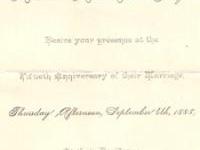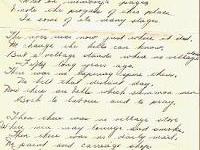 In September 1843, Daniel Way and the members of his family have moved into the Barnston area in a settlement that does not yet bear their name. The eldest son, Lorenzo Sweedenburg Way, is now a young man of 27 who has married Julia Ann Hodge on September 6, 1838.
In September 1843, Daniel Way and the members of his family have moved into the Barnston area in a settlement that does not yet bear their name. The eldest son, Lorenzo Sweedenburg Way, is now a young man of 27 who has married Julia Ann Hodge on September 6, 1838.
Julia Ann’s father, Chester Hodge, was from Glastonbury, Ct. Married to Polly Bascom in Bridport Vt, he made his way to Williamstown, Oswego County, N.Y. where Julia Ann was born in 1820. The family soon moved to Stanstead Township where Julia Ann and brothers Chester B., Roswell, John and Lorenzo (the name was popular then !) were raised.
 In 1827, Roswell Hodge and Lorenzo Way were in the same class at Griffin Corner’s school. Did Lorenzo and Julia Ann meet through young Roswell? Were they childhood sweethearts ? Certainly the Way and Hodge kids became lifelong friends. Lorenzo was the witness to John Hodge’s wedding in 1849. And Chester B. Hodge would become the foreman of Lorenzo’s woolen mill.
In 1827, Roswell Hodge and Lorenzo Way were in the same class at Griffin Corner’s school. Did Lorenzo and Julia Ann meet through young Roswell? Were they childhood sweethearts ? Certainly the Way and Hodge kids became lifelong friends. Lorenzo was the witness to John Hodge’s wedding in 1849. And Chester B. Hodge would become the foreman of Lorenzo’s woolen mill.
On September 6th 1888, Lorenzo Way and Julia Ann celebrate their 50th wedding anniversay in a village that has benefited from the family’s enterprising spirit, a village that by now bears Lorenzo’s family name with mention of the mills his family has built. On that September day in 1888, a party is thrown in honour of Lorenzo and Julia Ann. For the occasion, Fred Bacon, a Hatley resident and good family friend, has composed a poem for Lorenzo, nicknamed Lo :
«But other things are here, Lo.
Writ on memory’s pages,
I note the progress of this place
In some of its many stages.
The river runs now where it did,
No change the hills can know,
But a village stands where no village stood
Fifty long years ago.
There was no tapering spire then,
No bell that distant day,
Now there are bells which summon men
Both to labour and to pray.
Then there was no village store
Where men may lounge and smoke,
Then there was no daily mail,
No paint and carriage shop,
No place to get the horses shod,
No village school had we,
Where teacher ruled with birched rod
And taught the rule of three.
We had a mill to grind our corn
But we had no shingle mill.
Carding wool and spinning yarn
Were household duties still.
Weaving to was done at home
In hardpan days of yore,
‘Til good old Daniel Way came here
And Wayed the matter o’er.
He said to himself I’ll build a mill
And prove myself a neighbour
And pick and card and spin and weave
And lighten women’s labour.
Good as his word he built the mill.
And it runs full time today.
Long may he run who runs it now
And may it never run a-Way.
Now let us all writ loud acclaim
Pronounce the benediction
On him who gave the place a name
And a local habitation.»
In that one simple and beautiful poem lies the whole story of Way’s Mills : that of a people determined to improve their lot in life, to build schools for learning, churches for guidance, a post office, a store, shops and mills for comfort and sustenance.
Yet there is much more to tell about the people who made Way’s Mills their home along the banks of the Niger…the river whose vivacious waters are the power and the soul behind it all.
To be continued...